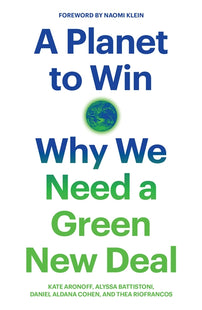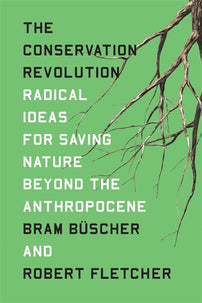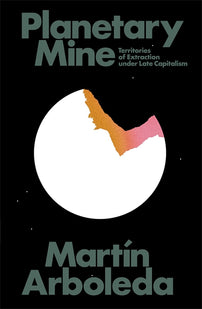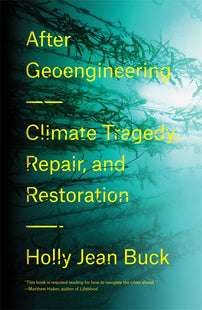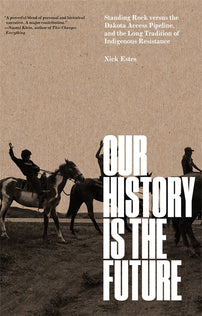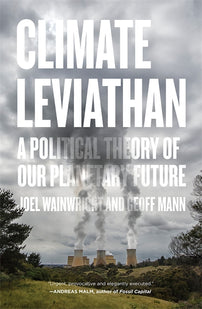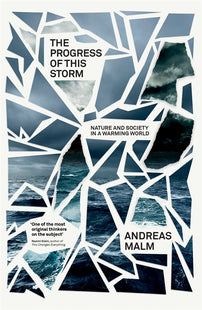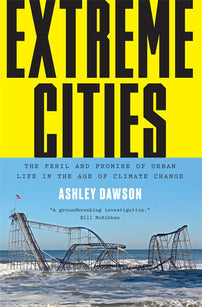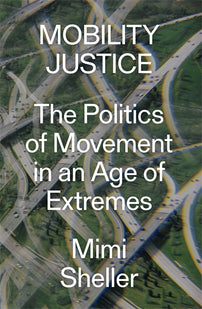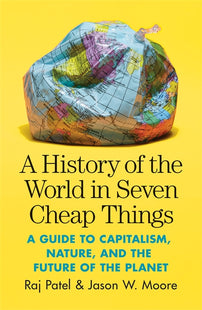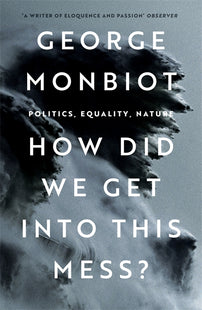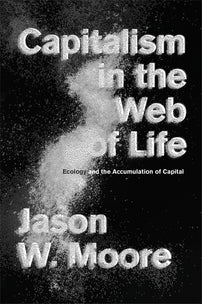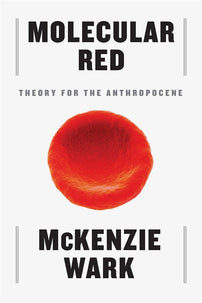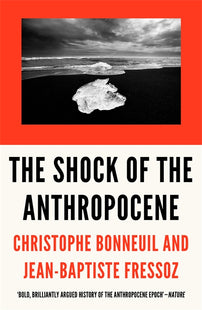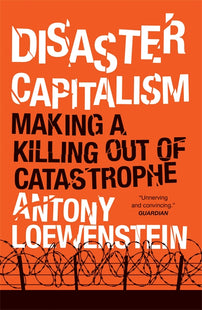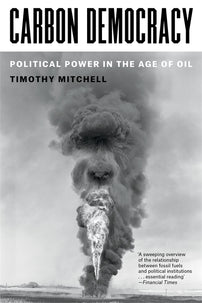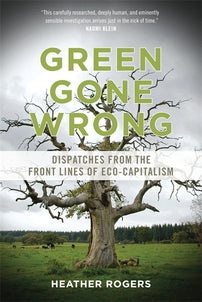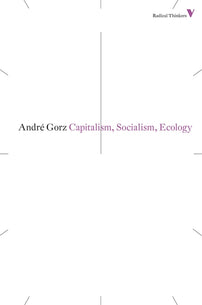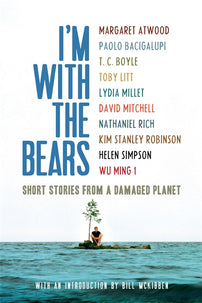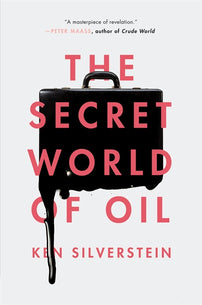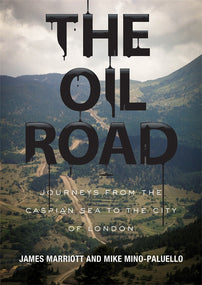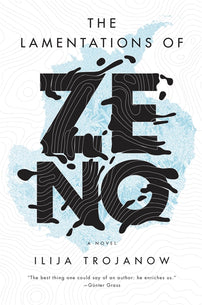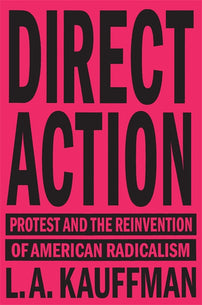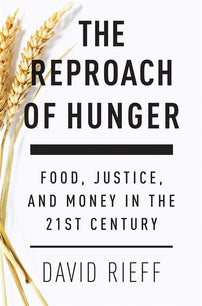The Climate Crisis and COVID-19
The COVID-19 pandemic is an emergency. So is climate disaster. We need a robust government response to both in the form of a Green New Deal and a just transition to a zero-carbon economy.

The COVID-19 pandemic and resulting economic collapse has revealed the foundational insecurity of neoliberalism. With governments passing massive stimulus packages in an attempt to save the economy, it's being made clear how possible it is for the state to retool the economy during moments of crisis.
How can activists highlight the other ongoing emergency, the existential threat of climate change, to organize for a Green New Deal and a just transition to a zero-carbon economy?
A Planet to Win explores the political potential and concrete first steps of a Green New Deal. It calls for dismantling the fossil fuel industry, building beautiful landscapes of renewable energy, and guaranteeing climate-friendly work, no-carbon housing, and free public transit. And it shows how a Green New Deal in the United States can strengthen climate justice movements worldwide.
[book-strip index="2" style="buy"]Building a razor-sharp critique of current conservation proposals and their contradictions, Büscher and Fletcher argue that the Anthropocene challenge demands something bigger, better and bolder. Something truly revolutionary. They propose convivial conservation as the way forward. This approach goes beyond protected areas and faith in markets to incorporate the needs of humans and nonhumans within integrated and just landscapes. Theoretically astute and practically relevant, The Conservation Revolution offers a manifesto for conservation in the twenty-first century—a clarion call that cannot be ignored.
[book-strip index="3" style="buy"]The Case for the Green New Deal argues that economic change is wholly possible, based on the understanding that finance, the economy and the ecosystem are all tightly bound together. The GND demands total decarbonization and a commitment to an economy based on fairness and social justice. It proposes a radical new understanding of the international monetary system. Pettifor offers a roadmap for financial reform both nationally and globally, taking the economy back from the 1%. This is a radical, urgent manifesto that we must act on now.
[book-strip index="4" style="buy"]Planetary Mine rethinks the politics and territoriality of resource extraction, especially as the mining industry becomes reorganized in the form of logistical networks, and East Asian economies emerge as the new pivot of the capitalist world-system.
[book-strip index="5" style="buy"]In this groundbreaking book, Holly Jean Buck charts a possible course to a liveable future. Climate restoration will require not just innovative technologies to remove carbon from the atmosphere, but social and economic transformation. The steps we must take are enormous, and they must be taken soon. Looking at industrial-scale seaweed farms, the grinding of rocks to sequester carbon at the bottom of the sea, the restoration of wetlands, and reforestation, Buck examines possible methods for such transformations and meets the people developing them.
[book-strip index="6" style="buy"]In 2016, a small protest encampment at the Standing Rock Reservation in North Dakota, initially established to block construction of the Dakota Access oil pipeline, grew to be the largest Indigenous protest movement in the twenty-first century. Water Protectors knew this battle for native sovereignty had already been fought many times before, and that, even after the encampment was gone, their anticolonial struggle would continue. In Our History Is the Future, Nick Estes traces traditions of Indigenous resistance that led to the #NoDAPL movement.
[book-strip index="7" style="buy"]To further the struggle for climate justice, we need to have some idea how the existing global order is likely to adjust to a rapidly changing environment. Climate Leviathan provides a radical way of thinking about the intensifying challenges to the global order. Drawing on a wide range of political thought, Joel Wainwright and Geoff Mann argue that rapid climate change will transform the world’s political economy and the fundamental political arrangements most people take for granted.
[book-strip index="8" style="buy"]In this blistering polemic and theoretical manifesto, Andreas Malm develops a counterargument: in a warming world, nature comes roaring back, and it is more important than ever to distinguish between the natural and the social. Only with a unique agency attributed to humans can resistance become conceivable.
[book-strip index="9" style="buy"]In Extreme Cities, Dawson offers an alarming portrait of the future of our cities, describing the efforts of Staten Island, New York, and Shishmareff, Alaska residents to relocate; Holland’s models for defending against the seas; and the development of New York City before and after Hurricane Sandy. Our best hope lies not with fortified sea walls, he argues. Rather, it lies with urban movements already fighting to remake our cities in a more just and equitable way.
[book-strip index="10" style="buy"]We are in the midst of a global climate crisis and experiencing the extreme challenges of urbanization. In Mobility Justice, Mimi Sheller makes a passionate argument for a new understanding of the contemporary crisis of movement.
Sheller shows how power and inequality inform the governance and control of movement. She connects the body, street, city, nation, and planet in one overarching theory of the modern, perpetually shifting world. Concepts of mobility are examined on a local level in the circulation of people, resources, and information, as well as on an urban scale, with questions of public transport and “the right to the city.” On the planetary level, she demands that we rethink the reality where tourists and other elites are able to roam freely, while migrants and those most in need are abandoned and imprisoned at the borders.
[book-strip index="11" style="buy"]Available in the UK only
In A History of the World in Seven Cheap Things, Raj Patel and Jason W. Moore present a new approach to analyzing today’s planetary emergencies. Bringing the latest ecological research together with histories of colonialism, indigenous struggles, slave revolts, and other rebellions and uprisings, Patel and Moore demonstrate that throughout history, crises have always prompted fresh strategies to make the world cheap and safe for capitalism.
[book-strip index="12" style="buy"]George Monbiot is one of the most vocal, and eloquent, critics of the current consensus. How Did We Get into this Mess?, based on his powerful journalism, assesses the state we are now in: the devastation of the natural world, the crisis of inequality, the corporate takeover of nature, our obsessions with growth and profit and the decline of the political debate over what to do.
“A dazzling command of science and relentless faith in people … I never miss reading him.” – Naomi Klein
Forty thousand people died trying to cross international borders in the past decade, with the high-profile deaths along the shores of Europe only accounting for half of the grisly total. Reece Jones argues that these deaths are not exceptional, but rather the result of state attempts to contain populations and control access to resources and opportunities. With the growth of borders and resource enclosures, the deaths of migrants in search of a better life are intimately connected to climate change, environmental degradation, and the growth of global wealth inequality.
[book-strip index="14" style="buy"]How did capital's insatiable addiction to the burning of fossil fuels begin? Andreas Malm's masterful new historical study charts the rise of fossil capital from its origins in the development of steam power to drive the burgeoning cotton industry in nineteenth century Britain to contemporary China's emisions explosion. Malm shows that it is the logic of capital, and not industrialism per se, that has driven us to the brink of climate catastrophe, and that a solution can only be sought in the overthrow of the current economic order.
Read Andreas Malm's essay on COP21 and the French crackdown on protests, 'Our Fight for Survival', on the Jacobin website.
Jason W. Moore's groundbreaking Capitalism in the Web of Life aims to skewer the nature/society dualism that has prevailed in so much radical thought - whether red or green. Instead, Moore takes Capitalism not simply as an economic system but as a way of organising nature.
Bringing together the contemporary crises of food, climate and finance into a masterful synthesis, Moore fundamentally refashions the way we see nature and human interactions with it.
Wark's Molecular Red is a search for the new philosophical tools that we need to confront the Anthropocene - the new geological era of man-made climate change. Wark explores the implications of Anthropocene through the story of two empires, the Soviet and then the American. The fall of the former prefigures that of the latter. From the ruins of these mighty histories, Wark salvages ideas to help us picture what kind of worlds collective labor might yet build.
[book-strip index="17" style="buy"]Scientists tell us that the Earth has entered a new epoch: the Anthropocene. We are not facing simply an environmental crisis, but a geological revolution of human origin. In two centuries, our planet has tipped into a state unknown for millions of years. How did we get to this point?
Refuting the convenient view of a "human species" that upset the Earth system unaware of what it was doing, The Shock of the Anthropocene proposes a new account of modernity that shakes up many accepted ideas: on the supposedly recent date of "environmental awareness," on previous challenges to industrialism, on the manufacture of consumerism and the energy "transition," as well as on the role of the military in environmental destruction.
[book-strip index="18" style="buy"]This immersive and engrossing oral history collection gives voice to the continuing struggle of Haitian people to live, love and prosper while trying to rebuild their city and country after disasters both natural and man-made.
[book-strip index="19" style="buy"]Best-selling journalist Antony Loewenstein travels across Afghanistan, Pakistan, Haiti, Papua New Guinea, the United States, Britain, Greece, and Australia to witness the reality of disaster capitalism.
"A keenly observed and timely investigation into rampant resource plunder, privatized detention centers, and an array of other forms of corporate rapacity on four continents.” – Naomi Klein
Does oil wealth lead to political poverty? It often looks that way, but Carbon Democracy tells a more complex story. In this magisterial study, Timothy Mitchell rethinks the history of energy, bringing into his grasp as he does so environmental politics, the struggle for democracy, and the place of the Middle East in the modern world.
[book-strip index="21" style="buy"]Faced with climate change, many counsel “going green,” encouraging us to buy organic food or a “clean” car, for example. But can we rely on consumerism to provide a solution to the very problems it has helped cause? Heather Rogers travels from Paraguay to Indonesia, via the Hudson Valley, Detroit, and Germany’s Black Forest, to investigate green capitalism, and argues for solutions that are not mere palliatives or distractions, but ways of engaging with how we live and the kind of world we want to live in.
[book-strip index="22" style="buy"]In Capitalism, Socialism, Ecology, Andre Gorz expands on the political implications of his prescient and influential Paths to Paradise and Critique of Economic Reason. Against the background of technological developments which have transformed the nature of work and the structure of the workforce, Gorz explores the political agendas facing both left and right. The crises of work and climate must force new ways of organising politically, as well as a reconfiguration of utopian demands.
[book-strip index="23" style="buy"]The size and severity of the global climate crisis is such that even the most committed environmentalists can drift into a state of denial. The award-winning writers collected here have made it their task to shake off this nagging disbelief, bringing the incomprehensible within our grasp and shaping an emotional response to mankind's unwitting creation of a tough new planet. From T. C. Boyle's account of early eco-activists, to Nathaniel Rich's comic fantasy about a marine biologist haunted by his youth, and David Mitchell's vision of a near future where oil sells for $800 a barrel—these ten provocative, occasionally chilling, sometimes satirical stories bring a human reality to disasters of inhuman proportions.
[book-strip index="24" style="buy"]Oil is the lifeblood of modern capitalism - but how does the oil industry function? Based on trips to New York, Houston, New Orleans, Paris, Geneva, and Phnom Penh, among other far-flung locales, The Secret World of Oil includes up-close portraits of Louisiana oilmen and their political handlers; an urbane, captivating London fixer; and an oil dictator's playboy son who had to choose among more than three dozen luxury vehicles before heading out to party in Los Angeles. Both an entertaining global travelogue and a major work of investigative reporting into the dark heart of fossil capital.
[book-strip index="25" style="buy"]A unique journey from the oil fields of the Caspian Sea to the refineries and financial centres of Northern Europe, James Marriott and Mika Minio-Paluello track the concealed routes along which flows the lifeblood of our economy.
[book-strip index="26" style="buy"]A literary fiction about climate disaster and a scientist imploding on a journey to the Antarctic from one of contemporary Germany's most celebrated writers.
German glacier expert Zeno Hintermeier is taking his last voyage to the Antarctic as a lecturer on board an international cruise ship. He attends to the curiosity of a privileged few as they marvel at the least explored continent and pay witness to its rapid degradation. In his early sixties, Zeno mourns the loss of his beloved glaciers, the disintegration of his loveless marriage, and the crumbling of his increasingly irrelevant career. Increasingly desperate he hatches a horrifying plan, and driven to the brink, he is convinced that his only option is to shake his fellow passengers out of their complacency and send a wake-up call to the world. With poignant, playful prose,The Lamentations of Zeno is a portrait of a man in extremis, a haunting tale that looks at the greatest challenge of our age from a uniquely human angle.
This deeply researched account, twenty-five years in the making, traces the evolution of disruptive protest since the Sixties to tell a larger story about the reshaping of the American left. Kauffman, a longtime grassroots organizer, examines how movements from ACT UP to Occupy Wall Street to Black Lives Matter have used disruptive tactics to catalyze change despite long odds.
[book-strip index="28" style="buy"]Available in the UK only
One of the most visible, and devastating, symptoms of climate change has been the food crisis. In The Reproach of Hunger, leading expert on humanitarian aid and development David Rieff goes in search of the causes of the reasons behind the failures to respond to the disaster. In addition to the failures to address climate change, poor governance and misguided optimism, Rieff cautions against the increased privatization of aid, with such organizations as the Gates Foundation spending more than the World Health Organization on food relief. The invention of the celebrity campaigner—from Bono to Jeffrey Sachs—have championed business-led solutions that have robbed development of its political urgency. The hope is that the crisis of food scarcity can be solved by a technological innovation. In response Rieff demands that we rethink the fundamental causes of the world's grotesque inequalities and see the issue as a political challenge we are all failing to confront.
